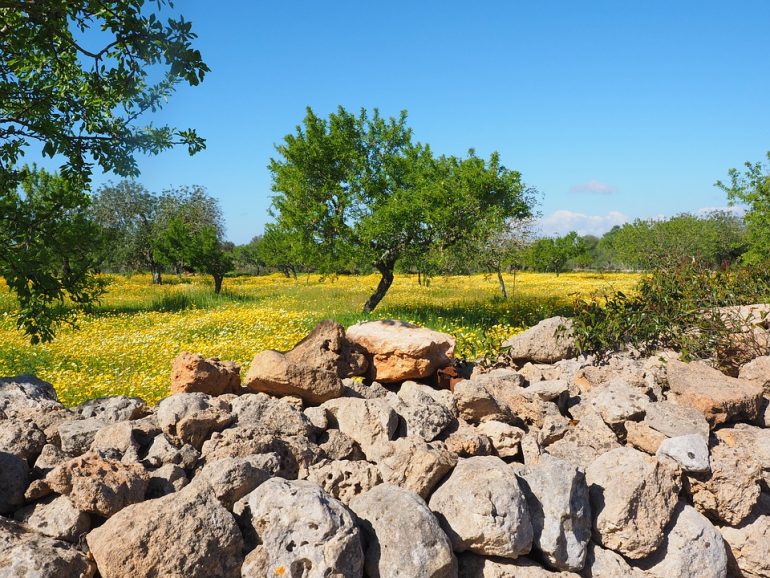How Lisa Radinovsky, a former English professor from Pennsylvania started a new life in Crete, dedicated to Greece’s liquid gold.
I am obsessed with olives, olive trees, and olive oil. Ask my family and friends: during walks and drives, I am distracted by silver-green olive branches waving in the breeze, enchanted by tiny yellow-white blossoms brightening the Greek spring, captivated by clusters of green olives growing under the hot summer sun, beguiled by darkening olives dripping with rain, and entranced by trees beneath the cloudscapes of the Cretan fall and winter.
Where did this love of olives and olive oil come from in a former English professor from Pennsylvania who barely noticed the dainty olive blossoms, ripening olives, or annual olive harvest during the first twelve years they surrounded her in Crete? Why does an American who once frowned on the strange customs of dipping bread in olive oil, dressing salads with nothing else, and baking cakes and cookies with this olive juice, now spend most of her time reading, writing, observing, talking, and thinking about olives and olive oil?
It all started with Olive Oil Times. I’d never heard of that online publication before I stumbled upon it about two years ago, as I was looking for new outlets for my writing about life in Greece today. It wasn’t quite what I had in mind. But I thought, “there are certainly olive trees around here,” even in my own Cretan neighborhood. So I started writing about the Cretan diet and lifestyle. I was then invited to cover the olive oil business in Greece. Who, me? I knew nothing about it. That quickly changed.
It wasn’t easy to learn about the Greek olive oil industry; there was little up-to-date information available online in English, and my Greek is not what it should be after so many years living here, and even more time with my Greek husband. Fortunately, my PhD in English was still good for something: well-honed research and analytic skills. I worked with Google translations of Greek agricultural news and soon began to meet the Greek olive oil tasters, exporters, producers, and experts who were kind enough to share their extensive knowledge with this ignorant American.
Increasingly absorbed by the olive’s journey, I observed and documented olive harvests and visited mills and factories to follow olives through modern stainless steel machinery until their liquid gold emerged. Engrossed in my olive oil education, I tasted the fresh extra virgin oil, searched for, shared, and experimented with olive oil recipes, and banished other fats from my kitchen. I was intrigued by the different theories about best cultivation and extraction processes, struck by the many recent scientific studies offering evidence for olive oil’s health benefits, and inspired by the people who cook with, taste, make, export, and promote olive oil.
Manolis Karpadakis, a dedicated marketer and exporter at Terra Creta and one of my first olive oil educators, reaches out to people around the globe to share an expertise and appreciation born of generations of family members growing olives. Eftychis Androulakis of Pamako researches and experiments with techniques that help him make the healthiest possible extra virgin olive oil from his family’s mountainside trees while attending to every detail, down to the cork and tag on his beautiful bottles.
Having given up a law career in the USA and Europe, Stratis Camatsos returned to his family roots during the economic crisis and now donates some of the proceeds from their evo3 olive oil to reforestation projects in Ethiopia, Madagascar, and Haiti. Dr. Tasos Anestis invests his scientific knowledge in meticulous care of his organic olive groves and production process at Rhizoma Olive Farms, creating a successful blend of tradition with the latest practices. Kyriakos Makratzis traded an exalted position as a ship captain for farm work in his olive groves, since he felt the olives calling to him across the seas.
These passionate, hard-working Greeks motivated me to share their stories, and the stories of their olive oil, with more readers. I learned that a lot of Greek extra virgin olive oil is sold at prices too low to ensure producers much, if any, profit, much of it sent to Italy to be mixed with olive oils from various countries, so famous olive oil from Italy can bring in high prices all over the world. I decided the world should know what the Greeks I’ve met are doing: producing, bottling, and exporting excellent 100% Greek extra virgin olive oil that should be adding flavor, aroma, and important nutrients to food around the globe.
As I became immersed in the Greek olive oil realm, with a widening network of contacts throughout Greece, the teacher and writer in me considered it a shame to keep my newfound knowledge to myself. So in August I launched Greek Liquid Gold: Authentic Extra Virgin Olive Oil, which I believe to be the first and only English-language website devoted to Greek olive oil, but not affiliated with an olive oil company.
I do not sell olive oil; I write about it and photograph it and everything related to it. My goal is to educate cooks, consumers, and buyers about the quality, origin, culinary uses, homeland, and health benefits of an underappreciated product that is central to a culture and way of life I have embraced with increasing fervor these past two years.
Enthralled by the natural abundance surrounding me in Crete, I pluck green Koroneiki olives from neighborhood trees and crush them between my fingers, inhaling their grassy tomato leaf aroma. Attracted by these little fruits, I watch for the best lighting and most striking backgrounds for their portraits. Openly documented on Greek Liquid Gold, my love affair with olives and olive oil blossoms and grows.



